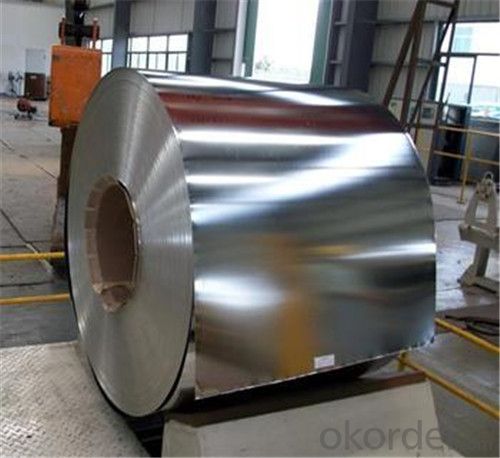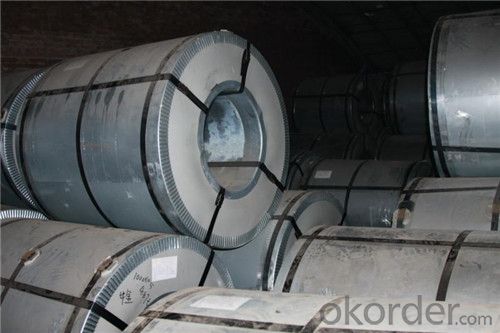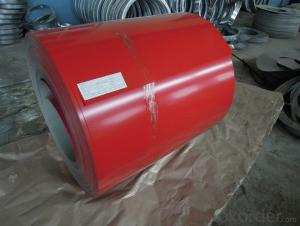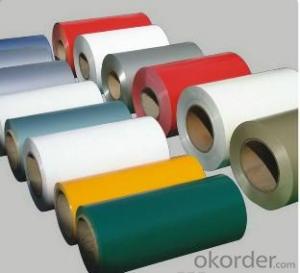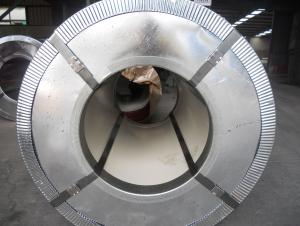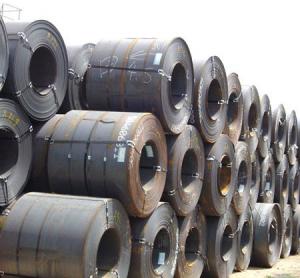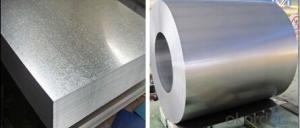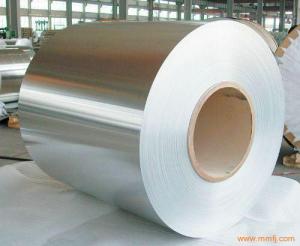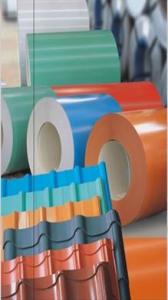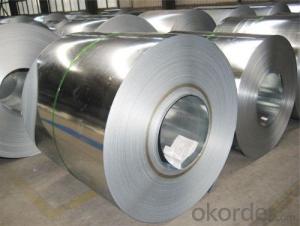Cold Rolled Hot Dipped Galvanized Steel Coils
- Loading Port:
- Shanghai
- Payment Terms:
- TT OR LC
- Min Order Qty:
- 36 m.t.
- Supply Capability:
- 30000 m.t./month
OKorder Service Pledge
OKorder Financial Service
You Might Also Like
BASE SUBSTRATE | Hot dip galvanized steel (HDGI), ZINCALUME STEEL COIL |
GRADE | SGCC,ENG10142, DX51D, ASTM A653 |
ZINC COATING | 30-200g |
COIL WEIGHT | 3-7TON |
INTERNAL DIAMETER(ID) | 508mm |
THICKNESS | 0.2-0.8 mm |
WIDTH | 914-1250mm |
FINISHING | SMOOTH OR MATTE |
PATTERN | MARBLE GRAIN OR WOOD GRAIN |
PAINT | EXPOXY, POLYESTER, PVDF |
TOP LACQURE COATING | >20 um |
BACK LACQURE COATING | 7 um |
CAPABILITY | 100000 TON per year |
QUALITY QURANTEE | 10 YEARS OF OUTDOOR USING FOR PE |
Applications of Prepainted Galvanized Steel Coil:
1) Buildings and constructions: roofing, ceilings, gutters, venting lines, indoor decorations, window frames, etc.
2) Electrical appliances: computer shells, washing machines, refrigerators, dehumidifiers, video recorders, water heaters, etc.
3) Agricultural equipments: troughs, feeding tools, agricultural driers, irrigation channels, etc.
4) Vehicle parts: back-seat plates of buses and trucks, conveying systems, oil tanks, etc.
Coating Chief Feature
| Project | Pencil hardness | Reverse impact | T bending | Cupping test | MEK cleaning |
| Front/back | ≥ H/2H | ≥ 9J/6J | ≤ 3T/5T | ≥ 6mm/4mm | ≥ 100time/50time |
Structure of GI/PPGI
| Item | Thickness | Type | Feature |
| Laminated film | 50μm | Polyethylene | Protecting from scratchs and contamination (option) |
| Top coat | 20μm | Polyester Fluorine | Chemical resistance and formability |
Primer coat | 5μm | Polyester | Workability, corrosion resistance and adhesion to the primer coating |
| Chemical treatment | 1μm | Chromate | Good adhesion and corrosion resistance |
| Substrate | 0.2mm-1.2mm | GI.GL,AL | GI.GL,AL |
| Back coat |
5±2μm |
Epoxy | Corrosion resistance and adhesion to the substrate |
- Q: i have a white spot on my stainless steel stove, its on the part behind the burners where the oven controls are, does anyone know what it may be and how to remove it. i have tried soap and water and stainless steel cleaner but neither worked. thanks!
- Barkeeper's Friend is the bomb for a metal and fiberglass cleaner, if it can be removed, it will remove it. I have no clue what it is thats on there.
- Q: Aluminum and Steel brittle or ductile based on these results? and why? Steel Aluminium% Elongation 0.2510.2705Modulus of E in ksi11833.33964.71Tensile Strength (ksi)87.5 51.5Yield Strength (ksi)78.5 41
- Only steel(of this pair)might be liable to brittle fracture,which would be implied by almost zero elongation or reduction in area at fracture.On this basis the steel has not failed by brittle fracture.I would expect much more elongation in pure aluminium than your sample shows so I presume it to be brittle unless it is an alloy rather than commercially pure aluminium.However brittle fracture in metals is a particular phenomenon to be determined by impact tests and examination of fracture surfaces and is particularly relevant to metals with the body centred crystal structure.
- Q: What are the different methods of painting steel coils?
- Painting steel coils can be achieved using various methods, each with unique benefits and practical applications. 1. Coil coating, an automated and continuous process, unwinds, cleans, pretreats, primes, paints, and cures the steel coils before rewinding them. This method guarantees precise paint application control and ensures a consistent finish. It is widely employed in high-volume production for industries like automotive and construction. 2. Spray painting, a versatile and flexible method, involves manually or mechanically spraying paint onto the steel coils. It allows for customization and precise control over the paint application. Depending on the desired finish and project requirements, spray painting can be done using techniques like airless spraying or electrostatic spraying. 3. Dip coating, also known as immersion coating, immerses the steel coils into a paint tank, ensuring complete coverage of all surfaces. This method is suitable for large or bulky steel coils that are not easily spray painted. Dip coating provides excellent coverage and is commonly used in applications like the electrical or appliance industry. 4. Powder coating, an electrostatic process, applies dry powder paint to the steel coils. Charged powder particles adhere to the grounded coils, creating a durable and even coating. This method offers superior resistance to impact, chemicals, and UV rays. It is frequently utilized in industries requiring high-quality and long-lasting finishes, such as aerospace or outdoor equipment. 5. Roll coating passes the steel coils through a series of rollers partially submerged in paint. As the coils move through the rollers, the paint is transferred to their surface. Roll coating is preferred for thin or delicate steel coils, as it provides a gentle and uniform paint application. It is commonly used in the appliance or electronics industry. Each method has its advantages and is selected based on factors like desired finish, production volume, cost, and project-specific requirements. Ultimately, the choice of painting method depends on achieving the optimal balance between quality, efficiency, and cost-effectiveness.
- Q: I want to know if Diamond is stronger than Steel.
- Diamond is harder than steel, which is why it will scratch steel. But hardness is not the same thing as strength. If you hit a diamond with a hammer it will shatter. Steel won't.
- Q: What are the different methods of welding steel coils?
- There are several different methods of welding steel coils, each with its own advantages and applications. The most common methods used in welding steel coils include: 1. Resistance Welding: This method uses pressure and electric current to generate heat and join the steel coils together. It is commonly used for high-speed production and can be further categorized into spot welding, seam welding, and projection welding. 2. Arc Welding: This method involves creating an electric arc between an electrode and the steel coils, which generates intense heat and melts the metal. There are various types of arc welding techniques, such as shielded metal arc welding (SMAW), gas metal arc welding (GMAW), and flux-cored arc welding (FCAW). 3. Laser Welding: Laser welding utilizes a highly focused laser beam to melt and join the steel coils together. This method offers precise control, high welding speeds, and minimal heat-affected zones, making it suitable for thin materials and intricate designs. 4. Electron Beam Welding: This technique employs a concentrated beam of high-velocity electrons to melt and fuse the steel coils. It is commonly used for welding stainless steel and other high-temperature alloys, as it provides deep penetration and minimal distortion. 5. Friction Stir Welding: In this method, a rotating tool with a pin is plunged into the steel coils, creating heat through friction. The softened material is then stirred together to form a solid joint. It is commonly used for joining aluminum, but can also be applied to steel coils. 6. Ultrasonic Welding: Ultrasonic welding involves applying high-frequency vibrations to the steel coils, which creates friction and generates heat to fuse the materials together. This method is commonly used for smaller steel coils and can provide fast and efficient welding with minimal distortion. These are some of the different methods of welding steel coils, each offering unique advantages and suitable for specific applications. The choice of welding method depends on factors such as the type and thickness of the steel, desired strength and quality of the weld, production speed, and cost considerations.
- Q: How are steel coils used in the production of metal staircases?
- Steel coils are an essential component in the production of metal staircases. These coils, typically made of high-quality carbon steel, are first uncoiled and then go through a series of manufacturing processes to shape them into the required stair components. The first step in the production process involves cutting the steel coils into the desired lengths using specialized machinery. This allows for customized sizing to fit the specific staircase design. Once cut, the coils are then formed into various shapes and profiles, such as stringers, treads, and risers, through processes like bending, rolling, and stamping. The use of steel coils provides several advantages in the production of metal staircases. Firstly, steel is known for its strength and durability, making it an ideal material choice for staircases that need to withstand heavy loads and frequent use. The flexibility of steel coils allows for the creation of intricate and complex staircase designs, providing architects and designers with a wide range of options. Furthermore, steel coils can be coated or finished in various ways to enhance their appearance and protect them from corrosion. This can include painting, powder coating, or applying a protective layer such as galvanization. These finishes not only add aesthetic value to the metal staircases but also increase their longevity and resistance to wear and tear. In summary, steel coils are integral to the production of metal staircases as they provide the raw material that is shaped and formed into the necessary components. Their strength, flexibility, and ability to be finished in different ways make steel coils a versatile and reliable choice for manufacturing durable and visually appealing staircases.
- Q: What are the characteristics of hot-rolled steel coils and cold rolled steel coils? What loading and unloading tools should be used? What items should be paid attention to?
- When placing materials to roll on both sides of the main pad wood pallets, prevent rolling back and forth. In addition the floor should be thickened, cannot have uneven or debris, because the line of steel coils when gravity concentrated in contact with the ground floor, there is a fracture easily, debris, easy to leave the indentation in the steel roll.
- Q: I am planning to buy a Walther P22. I have liked the Pistol's performance-superb.The only confusion that I have is about the Polymer Frame.Just for this I may shift to someother manufacturer.Are Polymer Frames better than Steel in durability and lifespan.Walther says YES.Any comments on this...Practical users...Thanks in advance
- Walther P22 Frame
- Q: Can steel coils be cut?
- Yes, steel coils can be cut.
- Q: Personally, I like Steel Cage matches to end in pinfalls. One of the biggest selling points of a Cage match is that it is to keep the competitors in and keep others out; essentially ensuring that it's a 1 on 1 match. As a result, I believe that pinfalls or submissions are important - but I know there's a lot of people that believe cage matches should only end in escape. What do you think??
- I don't really care either way. The only way I don't like it to end is when the door is opened and the person just walks out. That really isn't hard to win it like that. For last night I was hoping before the match that Bryan would win by escaping the cage. It fit his character, being a coward champ.
Send your message to us
Cold Rolled Hot Dipped Galvanized Steel Coils
- Loading Port:
- Shanghai
- Payment Terms:
- TT OR LC
- Min Order Qty:
- 36 m.t.
- Supply Capability:
- 30000 m.t./month
OKorder Service Pledge
OKorder Financial Service
Similar products
Hot products
Hot Searches
Related keywords




